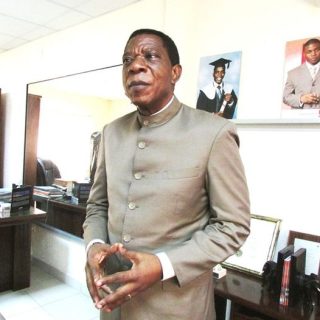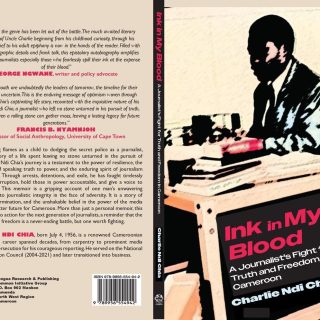Part 3: How Amity That Was Created By A Group Of Anglophones, Ended Up The Affiliate Of An Ivorian Bank.

The coming in of a heavyweight of the regime, Prof Joseph Owona, as shareholder of Amity Bank, helped the Board Chair/General Manager (PDG), Laurence Tasha, to hold on to his juicy position in the bank, as the force that wanted him out, got weaken. Prof Owona in fact helped Tahsa to do a number of things.. But along the line he could not continue to pay much attention to Amity Bank. The small group of ‘troublesome’ shareholders that included the PDG of SCTM Gas, Christophe Silienou, had not given up on their plan to get out Tasha from the post of PDG of Amity Bank. So when Prof Owona reduced his attention on the bank, the ‘troublesome’ group came back in force. Tasha started losing grip on Amity Bank.
It should be noted that the accusations that were raised against Tasha’s management of the bank by the small group of ‘troublesome’ shareholders that wanted him out, were not all false. The financial situation of Amity Bank was in reality not good, partly due to the conflict that Tasha had with Bongam. To cut short a long story, Amity Bank had liquidity problem.
Former Minister Becomes GM Of Amity Bank
Suffice to say that at one point, a former member of Government, Sanda Oumarou, replaced Tasha as General Manager of Amity Bank, with a mission to revive the ailing financial institution. The group of ‘troublesome’ shareholders led by Christophe Silienou, had finally succeeded to get Tasha out of the top post. By bringing in a northerner as General Manager of the bank, the small Bami group, that led the fight to push out Tasha, probably wanted to show that their fight was not a tribal issue, as Tasha’s supporters claimed.
Meanwhile despite his good intention, the former minister, Sanda Oumarou, as General Manager of Amity Bank, discovered that the task was more complicated and difficult to surmount. He found out that though Amity Bank had liquidity problems, the bank however had a substantial amount of money outside. There were quite a number of people who had gotten loans from Amity Bank, and had not repaid. It appeared that some of those debtors, who had passed for supporters of the different camps in the conflict in Amity Bank, took the loans without the intention to repay. Many were not even paying their interests on the loans they took. Some unscrupulous people apparently thought they could exploit the situation of the bank that was in camps, or under the situation of a bitter conflict, to borrow money and not repay.
Attempts To Recover Debts, Met With Stiff Resistance
This could be seen in the fact that, an operation that was launched by the management of Sanda Oumarou to recover the unpaid loans, met with stiff resistance and even anger. Very little was recovered, and thus the operation recorded very little success. As aforementioned, it was evidenced that many of the debtors of Amity Bank never had any intention to repay the loans they took.
That could be seen for example that a Francophone newspaper publisher in Douala who took a loan from Amity Bank seemingly without any intention to repay, instead got furious when he received a mail from the bank’s management, politely reminding him about the loan, and calling on him to clear his debt with the bank. The next day, the headline of his newspaper was a fake and alarming story, that Amity Bank’s account was in red due to poor management by the Sanda Oumarou’s team, and that the bank was about to crash. The paper said customers that had saved their money in the bank were frustrated, as they could not get out even the least amount. The management of Amity Bank was taken aback. However the management of Amity Bank which did not want to get the bank to embark on another court case, decided to ignore the fake news that was published by the debtor.
Sanda Oumarou Leaves The Post Of General Manager
One thing too which made it very difficult for the Sanda Oumarou management of Amity Bank to recover the debts, was that many of the debtors seemed to have obtained the loans from the bank under questionable conditions, as they did not present concrete collateral securities. Following their persistent failures to repay the loans, there was thus in many cases little or nothing as regards properties that the bank could sell to recover the money, or even to recover part of it. Suffice to say that as Amity Bank continued to face liquidity problems, Sanda Oumarou could not continue as General Manager.
It should be noted that Lawrence Tasha did not give up the fight to regain his position in Amity Bank. He embarked on a number of legal battles even at the level of the court of the Central African Economic and Monetary Community, CEMAC. Tasha in fact won some of the cases, but the Cameroon Government would not implement the court judgments, even though Tasha was the CPDM Sector President in his native Kumbo in Bui Division. That really left him frustrated.
A Francophone Become Majority Shareholder

Meanwhile in the face of the continuous liquidity problem that Amity Bank was facing, the Francophone businessman and shareholder, Christophe Silienou (General Manager of SCTM Gas), pumped in 400 million FCFA into the capital of the bank. Silienou who hailed from Upper Nkam Division in the West Region, became the majority shareholder of Amity Bank.
A couple of weeks after putting in the 400 million FCFA, the General Assembly of the Shareholders of Amity Bank, held in Limbe, Southwest Region, on a Saturday. This reporter was one of the only two journalists that had the privilege of being exceptionally authorized to attend the General Assembly of Amity Bank, which as usual held behind closed doors. This was in late 2003.
New Board Chair Shows His Real Colour
Meanwhile at the General Assembly of Shareholders of Amity Bank in Limbe, Christophe Silienou was formally presented as the majority shareholder of Amity Bank, and thus the new Board Chair. A Board Meeting was scheduled to hold in a week’s time in Douala, precisely the following Saturday, to among other things designate the new General Manager of the bank. The shareholders in general expected that the new General Manager of Amity Bank would be an Anglophone, especially as a Francophone had become the Board Chair.
But a few days later, precisely on the first Wednesday after the General Assembly of Amity Bank, the new Board Chair, Christophe Silienou, went ahead and unilaterally appointed one of his tribesmen and loyal friend, as General Manager of Amity Bank. Worse still, the man Slienou appointed as General Manager of Amity Bank, was a man with doubtful competence, in the management of a financial institution like a bank. What the controversial appointment also meant, was that the Anglophones had practically lost grip of their bank, that is, Amity Bank, which was the pride of the Anglophones!
New Majority Shareholder Plays A Fast One
Unfortunately still, the new majority shareholder and Board Chair of Amity Bank, Christophe Silienou, dishonestly did just like the pioneer majority shareholder and Board Chair, Isa Bongam, as regards the contracting of loans from the bank. After pumping in the 400 million FCFA to become the new majority shareholder and thus the new Board Chair of Amity Bank, and after hurriedly and unilaterally appointing his tribesman and loyal friend as General Manager of the bank, Silienou quietly obtained a number of loans from the bank within a short period of time. In fact with the complicity of his friend that he appointed General Manager of Amity Bank, Silienou in the name of loans quietly withdrew almost all the 400 million FCFA he had put into the bank as additional shares, that had made him become the new majority shareholder of the bank.
And so Amity Bank again found itself back in liquidity problem. This time around, the Central African Banking Commission, COBAC, which is the regulatory institution of financial institutions in the Central African Economic and Monetary Community, CEMAC Zone, could no longer hold back. COBAC thus intervened to restructure Amity Bank. A Provisional Administrator was appointed by COBAC to run Amity Bank, during the period of restructuring.
WACTCH OUT FOR PART 4 OF THE AMITY BANK STORY




